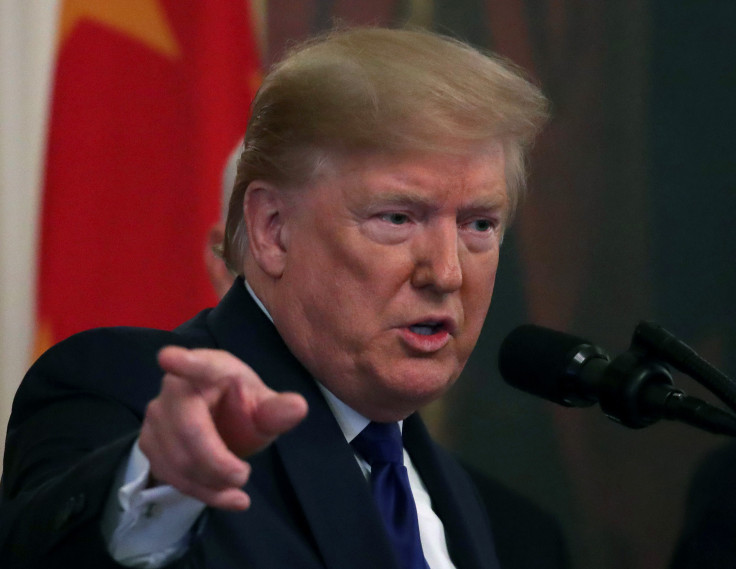
President-elect Donald Trump is once again threatening foreign nations with tariffs, this time targeting BRICS countries–Brazil, Russia, India, China, South Africa, Egypt, Ethiopia, Iran, and the United Arab Emirates. According to Trump's announcement on his social platforms, the tariff threat stems from BRICS members' perceived interest to "replace the U.S. Dollar."
100% Tariff on BRICS Nations
"The idea that the BRICS Countries are trying to move away from the Dollar while we stand by and watch is OVER," Trump wrote, adding that the countries would face "100% tariffs" and have to "wave goodbye to America" if they backed any other currency to "replace the U.S. Dollar" in international trade. "They can go find another sucker," Trump added.
The idea that the BRICS Countries are trying to move away from the Dollar while we stand by and watch is OVER. We require a commitment from these Countries that they will neither create a new BRICS Currency, nor back any other Currency to replace the mighty U.S. Dollar or, they…
— Donald J. Trump (@realDonaldTrump) November 30, 2024
Why does BRICS matter?
The BRICS alliance is a growing coalition of non-western countries considered emerging global powers. The alliance was founded in 2009 by Brazil, Russia, Indian, China, and South Africa, on the belief that international institutions were overly controlled by Western powers and no longer represented developing countries.
In 2023, BRICS held a summit in which it announced its most recent additions—Egypt, Ethiopia, Iran, Saudi Arabia and the United Arab Emirates. During the summit, "de-dollarization" was an important topic of discussion led by Russia's President Vladimir Putin, who accused the U.S. of "weaponizing" the dollar, per the Associated Press.
"It's not us who refuse to use the dollar," he said. "But if they don't let us work, what can we do? We are forced to search for alternatives."
Can BRICS Replace the Dollar?
While some analysts cited by the Council on Foreign Relations believe the coalition's growth could someday get them closer to their goal of implementing an alternative trade currency, skeptics cite a collection of "insurmountable challenges," including the nations' different stances on issues such as relations with the United States and the war in Ukraine.
"Meanwhile, economic and political instability in member countries has also shaken confidence in BRICS efforts. In the past decade, Brazil and South Africa have faced collapsing state capacity, yearslong recessions, chronic corruption, and crumbling infrastructure. China's economic slump also threatens the group's dynamism. Other major dividing lines include tensions between democracies and autocracies and long-standing rivalries such as those between Saudi Arabia and Iran and between Egypt and Ethiopia."
-Council of Foreign Relations
Trump's Earlier Tariff Threats
Earlier this week, Trump also threatened Mexico and Canada with 25% tariffs and China with an additional 10% tariff. He claimed the purpose of the tariffs was to curb the U.S. fentanyl crisis. While Canada's leadership responded with caution, promising to increase its efforts on border security, Mexican President Claudia Sheinbaum wrote a letter vowing to respond with retaliatory tariffs.
Trump's recent tariff announcements add up to his plans of imposing blanket tariffs on all imports into the United States. Critics, including Bloomberg News editor in chief John Micklethwait, have suggested Trump's strategy will end up being "like a national sales tax" for American consumers.
WATCH: The Bloomberg Host tried to claim that Trump's tariffs will hurt America's economy but ended up getting schooled by Trump on the facts
— George (@BehizyTweets) October 15, 2024
"The higher the tariff, the more likely it is that the company will come into the United States and build a factory in the US so it… pic.twitter.com/joQ96zWfU2
"America at the moment has $3 trillion worth of imports," Micklethwait told Trump in a live interview back in October. "You're going to add tariffs to every single one of them, that is going to push up the cost for all those people who want to buy foreign goods. That is simple mathematics."
Trump responded by defending his tariffs, claiming high and "obnoxious" tariffs would attract foreign businesses into the United States. "The higher the tariff the more likely it is that the company will come into the United States and build a factory in the United States so that it doesn't have to pay the tariff," he said.
© 2024 Latin Times. All rights reserved. Do not reproduce without permission.









